|
|
|
Sort Order |
|
|
|
Items / Page
|
|
|
|
|
|
|
| Srl | Item |
| 1 |
ID:
108130


|
|
|
|
|
| Publication |
Cambridge, Cambridge University Press, 2011.
|
| Description |
xiii, 282p.
|
| Standard Number |
9781107007598, hbk
|
|
|
|
|
|
|
|
|
|
|
|
Copies: C:1/I:0,R:0,Q:0
Circulation
| Accession# | Call# | Current Location | Status | Policy | Location |
| 056331 | 303.64/CUN 056331 | Main | On Shelf | General | |
|
|
|
|
| 2 |
ID:
136093
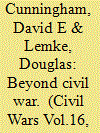

|
|
|
|
|
| Summary/Abstract |
A large quantitative cross-national literature examines why countries are more or less likely to experience civil war. Many of the theories motivating hypotheses about civil war are really arguments about when violence will happen without necessarily explaining why this violence is organized or targets the state. In this article, we examine how variables identified as causing civil war affect other forms of internal violence such as communal conflict, one-sided violence, riots, purges, and coups d'état. We find that factors such as ethnic fractionalization, population, terrain, economic development, and regime type similarly affect different measures of violence. We suggest two avenues for further research – expanding beyond civil war to study determinants of violence within countries more broadly and focusing more directly both theoretically and empirically on the specific determinants of civil war.
|
|
|
|
|
|
|
|
|
|
|
|
|
|
|
|
| 3 |
ID:
094689


|
|
|
|
|
| Publication |
2010.
|
| Summary/Abstract |
What explains the effect of external intervention on the duration of civil war? The literature on intervention has made some progress in addressing this question, but it has been hindered by an assumption that states intervene in civil wars either to help one side win or to facilitate negotiations. Often, however, external states become involved in civil war to pursue an agenda which is separate from the goals of the internal combatants. When states intervene in this fashion, they make wars more difficult to resolve for two reasons. First, doing so introduces another actor that must approve any settlement to end the war. Second, external states generally have less incentive to negotiate than internal actors because they bear lower costs of fighting and they can anticipate gaining less benefit from negotiation than domestic insurgents. Through Cox regressions using data on the goals of all interventions in civil wars since World War II, this article shows that when states intervene with an independent agenda, they make wars substantially longer. The effect of independent interventions is much larger than that of external interventions generally, suggesting that the established finding that external interventions prolong civil war is driven by a subset of cases where states have intervened in conflicts to pursue independent goals.
|
|
|
|
|
|
|
|
|
|
|
|
|
|
|
|
| 4 |
ID:
123019
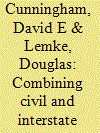

|
|
|
|
|
| Publication |
2013.
|
| Summary/Abstract |
Quantitative studies of conflict analyze either civil or interstate war. While there may be observable differences between civil and interstate wars, theories of conflict focus on phenomena-such as information asymmetries, commitment problems, and issue divisibility-that should explain both conflicts within and between states. In analyses of conflict onset, duration, and outcome combining civil and interstate wars, we find most variables have similar effects on both "types" of war. We thus question whether there is any justification for separate study of war types.
|
|
|
|
|
|
|
|
|
|
|
|
|
|
|
|
| 5 |
ID:
107533
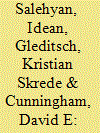

|
|
|
|
|
| Publication |
2011.
|
| Summary/Abstract |
Many rebel organizations receive significant assistance from external governments, yet the reasons why some rebels attract foreign support while others do not is poorly understood. We analyze factors determining external support for insurgent groups from a principal-agent perspective. We focus on both the supply side, that is, when states are willing to support insurgent groups in other states, and the demand side, that is, when groups are willing to accept such support, with the conditions that this may entail. We test our hypotheses using new disaggregated data on insurgent groups and foreign support. Our results indicate that external rebel support is influenced by characteristics of the rebel group as well as linkages between rebel groups and actors in other countries. More specifically, we find that external support is more likely for moderately strong groups where support is more likely to be offered and accepted, in the presence of transnational constituencies, international rivalries, and when the government receives foreign support.
|
|
|
|
|
|
|
|
|
|
|
|
|
|
|
|
| 6 |
ID:
091000
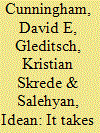

|
|
|
|
|
| Publication |
2009.
|
| Summary/Abstract |
Theories of conflict emphasize dyadic interaction, yet existing empirical studies of civil war focus largely on state attributes and pay little attention to nonstate antagonists. We recast civil war in a dyadic perspective, and consider how nonstate actor attributes and their relationship to the state influence conflict dynamics. We argue that strong rebels, who pose a military challenge to the government, are likely to lead to short wars and concessions. Conflicts where rebels seem weak can become prolonged if rebels can operate in the periphery so as to defy a government victory yet are not strong enough to extract concessions. Conflicts should be shorter when potential insurgents can rely on alternative political means to violence. We examine these hypotheses in a dyadic analysis of civil war duration and outcomes, using new data on nonstate actors and conflict attributes, finding support for many of our conjectures.
|
|
|
|
|
|
|
|
|
|
|
|
|
|
|
|
| 7 |
ID:
154843
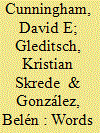

|
|
|
|
|
| Summary/Abstract |
Dissidents can choose among different tactics to redress political grievances, yet violent and nonviolent mobilization tend to be studied in isolation. We examine why some countries see the emergence of organized dissident activity over governmental claims, and why in some cases these organizational claims result in civil wars or nonviolent campaigns, while others see no large-scale collective action. We develop a two-stage theoretical framework examining the organized articulation of political grievance and then large-scale violent and nonviolent collective action. We test implications of this framework using new data on governmental incompatibilities in a random sample of 101 states from 1960 to 2012. We show that factors such as demography, economic development, and civil society have differential effects on these different stages and outcomes of mobilization. We demonstrate that the common finding that anocracies are more prone to civil war primarily stems from such regimes being more prone to see maximalist political demands that could lead to violent mobilization, depending on other factors conducive to creating focused military capacity. We find that non-democracy generally promotes nonviolent campaigns as anocracies and autocracies are both more likely to experience claims and more prone to nonviolent campaigns, conditional on claims.
|
|
|
|
|
|
|
|
|
|
|
|
|
|
|
|
|
|
|
|
|